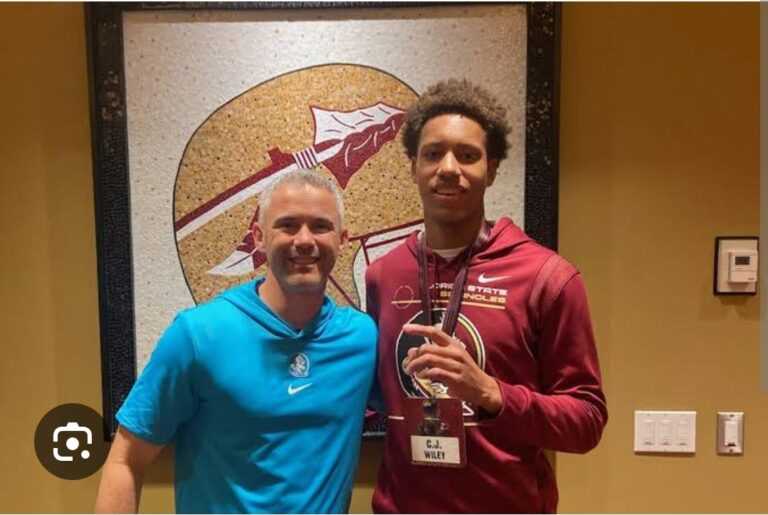CJ Wiley, a top football recruit, recently made headlines by decommitting from Florida State University (FSU) and committing to the Georgia Bulldogs. His decision has sparked significant attention, not only because of his talent but also because of the reasons he cited for backing out of his commitment to FSU. In a detailed explanation, Wiley expressed that his departure from the Seminoles was largely driven by concerns over the leadership of FSU’s head coach, Mike Norvell. According to Wiley, Norvell’s leadership style and coaching abilities were insufficient, which ultimately led him to seek an opportunity with Georgia, where he feels more confident in the program’s direction and coaching staff.
One of the key points Wiley made was that Coach Mike Norvell’s leadership at FSU appeared to be weak and lacking the assertiveness and vision necessary to lead a program like the Seminoles. Wiley specifically noted that Norvell’s inability to inspire and motivate his players, along with the perceived lack of a clear long-term strategy for the program, were major factors in his decision to decommit. While Norvell had shown promise in his early years with the Seminoles, his tenure has been marked by inconsistency on the field. Under Norvell, FSU has struggled to return to the level of success the program enjoyed in its heyday, and that instability has not gone unnoticed by recruits like Wiley.
Wiley also suggested that Norvell’s lack of proven success at the highest level was a significant concern. Although Norvell has had some success, including leading the Seminoles to bowl games and improving their recruiting in recent years, FSU has not been able to consistently compete at the elite level that is expected of a program with the history and resources of the Seminoles. Norvell’s inability to secure high-profile wins against top-ranked teams and his team’s struggles in crucial moments have left some questioning his ability to get the most out of his roster. For a player like Wiley, who likely envisions himself playing at the highest level of college football, the uncertainty surrounding Norvell’s future at FSU may have been too much of a risk.
In contrast, Georgia’s head coach, Kirby Smart, is widely regarded as one of the top coaches in college football today. Smart has led the Bulldogs to a national championship and consistently fields one of the most competitive teams in the country. His track record of developing elite talent and his leadership on and off the field made Georgia an appealing option for Wiley, who is looking to make a significant impact on a championship-contending team. For Wiley, Smart’s proven ability to develop players and win at the highest levels likely made Georgia the more attractive choice, as it provided a clear path to competing for national titles and preparing for a potential career in the NFL.
Wiley’s decommitment also highlights a larger trend in college football, where recruits are increasingly placing a premium on strong leadership and program stability when making their decisions. With the rise of the transfer portal and NIL (Name, Image, and Likeness) opportunities, players now have more freedom and agency than ever before in choosing where they want to play. As a result, the onus is on coaches like Mike Norvell to demonstrate not only tactical proficiency but also the ability to foster a winning culture and provide clear direction for their teams.
Ultimately, CJ Wiley’s decision to decommit from FSU and commit to Georgia is a reflection of the challenges facing Mike Norvell and the Seminoles program. While Norvell may still have time to turn things around, his failure to convince recruits like Wiley of his vision and leadership has led to significant losses on the recruiting trail. For Georgia, however, this move represents another win for a program that continues to assert itself as one of the premier destinations for top-tier talent in college football.


